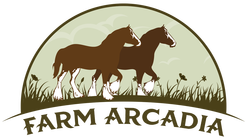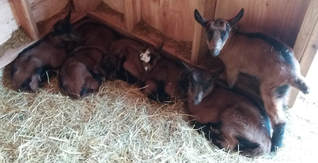 If you're new to sheep or goats or haven't had them before, this is what I share with people who inquire about getting them. Often it is with the idea of keeping weeds at bay or having fresh easy milk on hand. Neither are necessarily a bad idea, but it's likely not quite as simple as most people think. Everyone has a learning curve, and this is designed to give you an introduction into casually keeping goats or sheep. You Need More Than One 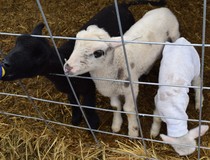 Goats and sheep are herding animals. They need to be in a herd or with others like themselves. If you don't do this, they become nervous, noisy, anxious, and less friendly. When I say noisy, I don't know if this conveys how bad it can be. Depending on the animal, they may call all day and night. They are stressed. Herding is social where they bond with other animals, but it is also a safety strategy. If there are many sets of eyes and ears keeping a lookout for danger, it allows others to relax. They also rely on each other in the colder weather to sleep together and share body heat. So, I've had people tell me that they will visit their new goat several times everyday and their dog will be with him all day. Sorry, that doesn't count. Other goats and sheep count - they can be mixed. Cows and horses don't count. A donkey might if it bonds to them, especially if it's a mini and the only one. Human visits and dog companions probably don't count either. They need other small ruminants. Not hogs, poultry, or yaks. I don't know about llamas and alpacas - they might work. Watch out for bullying among the animals, which can be pretty severe. It's not really something you train them not to do. They Need Shelter Goats need to get out of the rain. Sheep like to also, but I find them to be more tolerant as their fleeces are oily and give them a little waterproof jacket. In the winter, the shelter needs to give them a break from the snow and wind. It doesn't need to be heated, but it is nice to have a good supply of bedding (usually straw) so they can nestle in and get warm. In the summer, they also need shade. Pale animals, especially white, are prone to sunburns. Dark animals are more likely to overheat. They need a location where they can get out of the sun and rest during the sunniest hottest parts of the day. Shelter is a must. Plan to Buy Food & Health Care Items 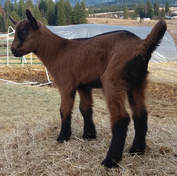 Both goats and sheep need food year-round. In the winter, that usually means feeding them hay you grow or have purchased. You'll either need to get a feeder or plan on having some of the food lost to waste from them laying on it and pooping and peeing on it. They don't really control where they go, but they won't eat what's been soiled. If you want or if they tend to be thin, you may want to feed them treats, grain, or pellets. I feed mine grain when milking or thin, but another option are alfalfa pellets or similar that are fed to rabbits. They are really compressed hay and won't have the same potential problems as does feeding grain - like grain poisoning. (It's good if you want to hand feed a lot or have visitors who come over who may overfeed grain, but would like to hand feed.) Plan on providing other items. Our area and many areas in the US don't have enough copper or selenium. Goats require copper (sheep should not be supplemented at all) and both need selenium. Without copper, goats tend to get parasitic infections, poor coats, and easily become anemic. Copper can be toxic to sheep, so avoid and make sure they don't have access to minerals with copper as they will consume it. Selenium is important to both for proper development and immune system. If you have only one specie, get minerals (like a salt lick or loose granules) that are available all the time specific for that type of animal. Plan on deworming. They should have regular vaccines - once or twice a year. Your sheep or goat will not become autistic and it will save them from myriad diseases in their environment. They are usually very easy to give and inexpensive, but plan on doing it. Not controlling parasites and not providing vaccines is negligent ownership. Plan on Containment I suppose you can tie goats and sheep out, but you will be amazed at their ability to tangle themselves. They can strangle themselves (to death depending on the tie-out material) or get hog-tied so badly they can't protect themselves. If you have fence and they see something on the other side that they want, they may be very clever at finding the only weakness in the fence to get through. If they have access to plants or items you don't want disturbed, goats will disturb it. Sheep don't seem to do this much. Goats would LOVE to dine on your rose bushes, young evergreen, and climb on your car. Vehicles are amazing playgrounds. They will also try to work loose wires on trailers or tractors. They will hop up on benches and seats and leave them sprinkled with goat berries. Just be ready to keep them where you want them. Milking Isn't a Spigot What do you think about this inquiry for a sheep or goat? (This is what I'm asked sometimes, but not from any one particular person.) "I would like a sheep/goat in milk that is due to lamb/kid soon. I'd also like a young bred female that will be easy to milk for me and my kids." Or, "I'd like one sheep/goat in milk that we can also use to keep our weeds down with enough milk to make some parmesan." Those are fairly common requests. I understand what they are looking for. Upon further inquiry, they do not have other goats or sheep and have not milked animals before. Here is my feedback.
Goats and sheep have the potential to make excellent livestock pets. It's not the same as buying a cat or dog. With correct expectations, it can be a very enjoyable experience.
1 Comment
Terri
5/25/2018 01:46:09 pm
Sweet little goat. I love your blog.
Reply
Your comment will be posted after it is approved.
Leave a Reply. |
Mindy HelmsWife to Brandon, mother to Tess and Liam, farmer, entrepreneur, cook & baker, nurse, and accountant who loves to try new things, travel, and work toward greater self-reliance. Archives
May 2024
Categories
All
|
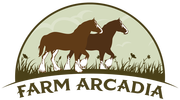
 RSS Feed
RSS Feed
